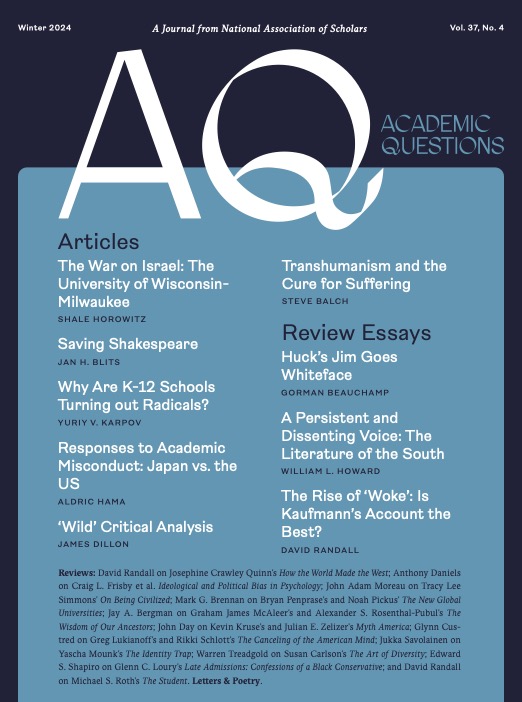Classical Origin of Southern Literature, James Everett Kibler Jr., Abbeville Institute Press, 2022, pp. 392, $37.00 hardcover.
Faulkner the Southerner and the Continuity of Southern Letters, James Everett Kibler Jr., Abbeville Institute Press, 2023, pp. 352, $37.00 hardcover.
Our judgments of value are characteristically dependent on attitudes peculiar to our own place and time. If we universalize these attitudes … we turn history into a mirror which is of significance to us insofar as we may perceive in it what appear to be foreshadowings of ourselves … And when this happens, history … becomes merely an instrument for the cultivation of our own prejudices.
— D. W. Robertson, Jr. A Preface to Chaucer: Studies in Medieval Perspectives (2016)
Today’s American might find the historical South as foreign as Europe in the Middle Ages. All the more reason for studying it. The best food for starving minds lies far beyond the hall of mirrors that is contemporary American thought. But as D. W. Robertson cautions in his Preface to Chaucer, to be nourished by the past requires suspending one’s cultural prejudices. To read the past as if it mirrored oneself would simply reinforce the self-reflexive tendencies of our time. James Everett Kibler, Jr.’s two books offer a basis for understanding the culture and history from which the South’s literature springs. Because he treats it without facile condescension or obtrusive reflexivity, readers can become acquainted with many of the qualities of historical America that have since been devalued.
Once arguably the most important region of the country during the early years of the republic—four of the first five presidents were from Virginia—the South lost influence and eventually a civil war to the more powerful North. Except for the interest aroused by descriptions of Southern battlefields during that war and by the regional particularities depicted in local color writings immediately after it, the South lost cultural importance. As the North embraced material, educational, and philosophical progressivism, it increasingly abandoned traditional ways of living and thinking. Some Southern thinkers believed that the North had rejected the very idea of a culture with fixed verities at its root. A modernizing, Northern-dominated culture left the South, whose identity was bound up in tradition, a dispossessed stepbrother. Although “the United States are” was standard grammar before the Civil War, the triumph of the North was confirmed in the popular press after the war when the clause was reformulated as “the United States is,” a brilliant device for delegitimatizing the independence of the Southern states and propagating an entirely new notion of unity. The new subject-verb grammar represented an inexorable assertion of irrevocable political power.
Fortunately for American literary history, the dispossessed stepbrother came to relish his own rebellious voice. Flavored by a large dose of contrariness, Southern literature was the result. Nineteenth-century writers such as William Gilmore Simms and Edgar Allan Poe delighted in critiquing the new fads of the Northern intelligentsia. Everything from Unitarian do-goodism to Transcendental kookiness to Daniel Webster’s ham-handed effort to de-traditionalize the English language were pilloried. In the early twentieth century, the fugitives and agrarians defied the North’s planned trajectory for the U.S. with biting criticism and a fervent defense of the alternative civilization the South had built. Writers of the Southern Renaissance depicted a quirky, history-imbued South whose culture was disrupted but never extinguished. When asked if the Southern writer felt anguished being isolated from the rest of the United States, Flannery O’Connor gave a characteristically Southern reply: “The anguish that most of us have observed for some time now has been caused not by the fact that the South is alienated from the rest of the country, but by the fact that it is not alienated enough.”
As his two book titles indicate, Kibler seeks to establish cultural continuity in Southern letters. Thomas Jefferson wrote that rural landowners were living the ideal life, and Wendell Berry echoes similar sentiments 250 years later. Early settlers of the Southern colonies highly valued Roman literature, particularly Virgil. Southern boys were trained in Latin and Greek before they ever set foot in a college. The story of Aeneas fleeing a burning Troy and founding a new civilization in Rome resonated with Southern writers, especially after the Civil War.
Following suit, Allen Tate’s twentieth century poetry is replete with classical allusions. Southerners of multiple generations delighted in sharply distinguishing their own critical standards from those of the North. Poe thought the transcendentalists were “Frogpondians,” important only to themselves. Simms called their philosophy “balderdash.” To Kibler, the obscurity of the Southern writers who preceded William Faulkner is due more to the arrogance of Northern culture-makers than to any deficiency in the quality of their writing.
In his book on Faulkner, Kibler seeks to correct literary and historical misreading that discounts the Nobel Prize Winner’s cultural Southern-ness. A certain amount of revisionism has been necessary for the intelligentsia to justify Faulkner’s inclusion in a literary canon suitable for the super-sensitive. Nevertheless, over the past sixty years Faulkner has been the hottest commodity in English literary study, with more words written about him than about Shakespeare. This is a mixed blessing. On the one hand, it is a testament to the excellent quality of his writing; on the other, his books have also become the perfect ciphers for a surplus of university culture-decoders trained in critical theory. Race, class, gender: his books have plenty of fodder for the critical theorist. If the arbiters of cultural power understood Faulkner as thoroughly as Kibler does, however, they might realize that some of his cultural assumptions stand in direct opposition to their own. If they ever catch on, it is not inconceivable that Faulkner’s work might be consigned to a dark basement like a fallen statue of Robert E. Lee.
In Kibler’s view, Faulkner was a great writer who arose from a highly particularized cultural heritage and from a distinguished if obscure line of authors who valued fixed truths. Faulkner’s cultural assumptions are like those of his predecessors, Kibler maintains. They are Southern to the core and stand in stark opposition to Northern ones. He was a modernist writer steeped in traditional culture. As O’Connor explains her own Southern-ness, “This discovery of being bound through the senses to a particular society and a particular history, to particular sounds and a particular idiom, is for the writer the beginning of a recognition that first puts his work into real human perspective for him.… He discovers that the imagination is not free but bound.” When Faulkner first gained the attention of Northern critics, Kibler argues, they mistook his alienated characters’ disaffection from Southern society for Faulkner’s own. They continue to make that mistake. Although Faulkner may have understood the cultural pressure on Quentin Compson at Harvard to “hate” the South, ultimately Faulkner was not Quentin. The society around him and his own family history commanded his fealty.
Kibler not only observes that Faulkner’s work is a continuation of earlier Southern literature but also notes how the misinterpretations of Faulkner are consistent with other Northern misapprehensions of Southern culture. His novelistic critiques of failed characters, for example, have facilitated Northern critics’ ventures into self-righteous condemnation of the South itself. In fact, says Kibler, Faulkner is remarkable precisely because he was firmly bound to the South even as he frankly acknowledged its flaws. The ruthless Thomas Sutpen of Absalom, Absalom! was not created as a representative Southern plantation owner but as an ambitious and ruthless wannabe. He represents mankind’s general susceptibility to envy and hubris. The South is simply the stage on which this arrogant man’s tragedy is acted.
Kibler goes beyond the fictional masterpieces to highlight some of the great novelist’s essays, speeches, and occasional writings. These works further support Kibler’s contention that Faulkner identified himself as a Southerner. A remarkable example can be seen in a speech he delivered when on a State Department-sponsored trip to Japan. His selection to represent the United States in Nagano, Japan, ten years after the end of World War II, serves as a telling picture of Dwight D. Eisenhower’s administration and its insight in choosing a Southerner for a diplomatic mission to post-war Japan. Faulkner had a keen appreciation of the psychological state of a proud country defeated in war and subsequently occupied. Fully aware that he descended from those who were on the losing side of the Civil War, he pointed out in a speech “To the Youth of Japan” the parallel between the situations of the post-World War II Japanese and post-Civil War Southerners. He spoke of the Civil War as an invasion of the South by the North. His proofs derived from family experience. In 1864, his maternal great-grandmother pleaded with General A. J. (“Whiskey”) Smith to spare the Oxford Inn she owned when he raided Oxford, Mississippi. But he insulted her and burned it down along with most of the stores and private homes in the town. Similarly, the plantation house of Faulkner’s paternal great-grandfather, a Confederate colonel, was burned down before his wife’s eyes, again despite her pleas to spare it.
Consistent with the duties of diplomacy, however, Faulkner also pointed out to his Japanese audience a major difference between the treatment of the South and Japan. The United States was contributing to the reconstruction of Japan, while the victors of the American Civil War “’made no effort to rehabilitate and reestablish us in any community of man or of nations.’” Reconstruction was a decade of “’despoiling us of what little war had left.’” Under Eisenhower in 1955, then, Faulkner and the South were included in the American story. A Southern author was chosen to help represent a reunited U.S. to a defeated Japan invited to be reunited with the world. It is hard to imagine such a delegation being assembled by today’s government.
Kibler is well-acquainted with Southern literature and culture, having spent his life in the South and having devoted a long career to teaching Southern literature at the Universities of South Carolina and Georgia. He estimates that the material in these books was taught to some 2800 students. Despite his excellent credentials and the important information his work provides, these two books did not, apparently, meet the expectations of academic presses, not even Southern ones.
I can only speculate about this, but his being a frank apologist for Southern culture must have made the contemporary academic mind squeamish. The woke intelligentsia has censorship power over the way the American (especially the Southern) story is told, and that censoring power is even greater today than in the past. Is it coincidental that a major part of the life’s work of this Southern scholar should have been denied publication by academe even as the Southern Poverty Law Center was categorizing him and other scholars associated with the Abbeville Institute as “ideologues” and “neo-Confederates”?
The publication of these two books is a tribute to the perseverance of scholars driven to the fringes of academe by wokeism and libeled by hate groups masquerading as monitors of hate groups. If traditional views of the American South are a diversity too far for university-affiliated presses, the Abbeville Institute and Professor Kibler are especially to be commended for having the courage of their convictions and seeing that these two fine books were published.
William L. Howard is Professor of English (ret.), Chicago State University. His most recent article in Academic Questions was “The Decline and Fall of Two American Institutions,” for our Summer 2024 issue.
Photo by Sean Foster on Unsplash














